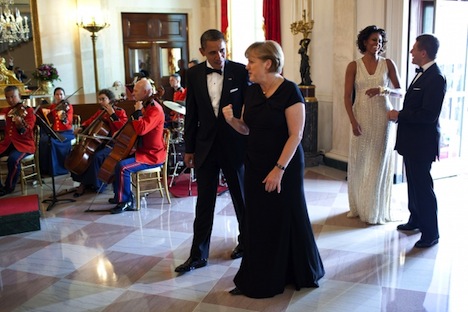Last Sunday’s election wasn’t just a victory for the German center-right — it was a very personalized victory for Germany’s chancellor, Angela Merkel, who will become just the third postwar chancellor to serve three terms.* ![]()
![]()
Germans largely saw Merkel as the only viable chancellor candidate (sorry, Peer Steinbrück!), and they flocked to support Merkel for steering Germany largely unscathed through a global financial crisis and a subsequent eurozone crisis in an export-oriented economy that’s still growing and producing jobs for Germans. They admire the fact that she’s steered the eurozone through the worst of its sovereign debt crisis and avoided the single currency’s implosion, all while tying bailouts for Greece and other Mediterranean countries to austerity and reform measures that would make more profligate countries (like Greece) more ‘German’ in their approach to state finances.
But beyond the infantilizing ‘Mutti’ meme or the idea that Merkel represents a ‘safe pair of hands,’ she has won over many Germans because she’s been such a pragmatic and non-ideological leader. Though Merkel leads the ostensibly center-right Christlich Demokratische Union Deutschlands (CDU, Christian Democratic Party), it’s really hard to know what the CDU stands for these days other than the continuity of another Merkel government — and that’s likely to pose a difficult challenge for Merkel’s successor in 2017 or 2021 or whenever.
Merkel’s made some ideological compromises to her Bavarian counterparts, the Christlich-Soziale Union in Bayern (CSU, the Christian Social Union) — for instance, she has avoided the question of marriage equality, preferring that the German constitutional court largely deliver equal rights and benefits to same-sex partners at a time when both conservative governments (in the United Kingdom) and leftist governments (in France) deliver legislative solutions.
By and large, though, Merkel eschews ideological litmus tests. Merkel campaigned on an economic agenda that varies only slightly with that of her rival center-left Sozialdemokratische Partei Deutschlands (SPD, Social Democratic Party). While the SPD favored a €8.50 minimum wage, Merkel pushed a sector-by-sector minimum wage approach. Both parties supported increasing elements of the German social welfare model, such as child allowances and a rise in pensions. While the SPD and other leftists pushed for tax increases, Merkel has been content to draw a line at merely no tax increases, to the disappointment of Merkel’s liberal coalition partners, the Freie Demokratische Partei (FDP, Free Democratic Party), who were completely wiped out of Germany’s parliament in Sunday’s elections. After the nuclear meltdown of the Fukushima reactor in Japan in 2011, Merkel announced that Germany would phase out nuclear energy, thereby accomplishing in one fell swoop one of the German left’s top priorities since the 1970s — and perhaps the top policy goal of the Die Grünen (the Greens).
German political scientists refer to it as ‘asymmetric demobilisation‘ — Merkel has so blurred the lines between her position and the SPD position that on the top issues — economic policy, Europe, foreign affairs — the SPD can’t draw an effective contrast to her.
Merkel, in essence, has governed as a perfectly non-ideological leader.
Sound familiar?
It should to most Americans, who elected Barack Obama in 2008 in large part due to his pledge to transcend the increasingly polarized politics of the United States. Here’s what Obama said upon accepting the Democratic Party’s nomination for president that summer:
America, our work will not be easy. The challenges we face require tough choices, and Democrats as well as Republicans will need to cast off the worn-out ideas and politics of the past…. For eighteen long months, you have stood up, one by one, and said enough to the politics of the past. You understand that in this election, the greatest risk we can take is to try the same old politics with the same old players and expect a different result.
In effect, Merkel has done, in her quiet and unassuming way, what Obama has utterly failed to do — govern in a way that transcends traditional ideological divides.
You could say that Obama’s rhetoric is the standard boilerplate that any change candidate serves up in American politics — the same ‘Washington-is-not-the-answer’ tropes that Republicans and Democrats have rolled out since Ronald Reagan swept to power 33 years ago on an appealing anti-government message. But Obama’s reputation in 2008 came mostly from his keynote address to the 2004 Democratic national convention on this precise issue:
Yet even as we speak, there are those who are preparing to divide us, the spin masters and negative ad peddlers who embrace the politics of anything goes. Well, I say to them tonight, there’s not a liberal America and a conservative America — there’s the United States of America. There’s not a black America and white America and Latino America and Asian America; there’s the United States of America. The pundits like to slice-and-dice our country into Red States and Blue States; Red States for Republicans, Blue States for Democrats. But I’ve got news for them, too. We worship an awesome God in the Blue States, and we don’t like federal agents poking around our libraries in the Red States. We coach Little League in the Blue States and have gay friends in the Red States. There are patriots who opposed the war in Iraq and patriots who supported it. We are one people, all of us pledging allegiance to the stars and stripes, all of us defending the United States of America.
So there’s a lot of reason to believe that Obama genuinely believed he could transform the political dynamic in American politics.
But his absolute lack to do so is perhaps Obama’s greatest failure as a president. Say whatever you want about his policies, the Obama era in many ways constitutes a high-water mark for American political polarization. Republicans now lean even more to the right, in the thrall of a tea party movement that demands no compromise from Republican officeholders.
There are all sorts of rationales that explain why Merkel has succeeded in becoming non-ideological and why Obama hasn’t — but none of them are completely satisfying. Continue reading That ‘transcending ideology’ thing from Obama 2008? Angela Merkel did it. Obama hasn’t.

